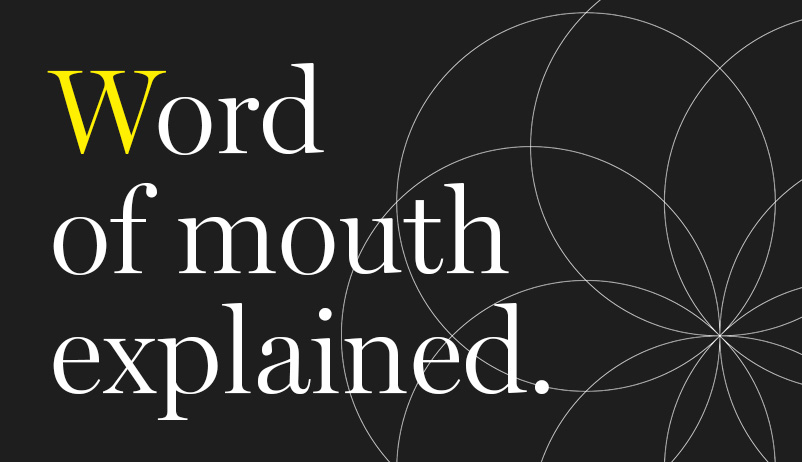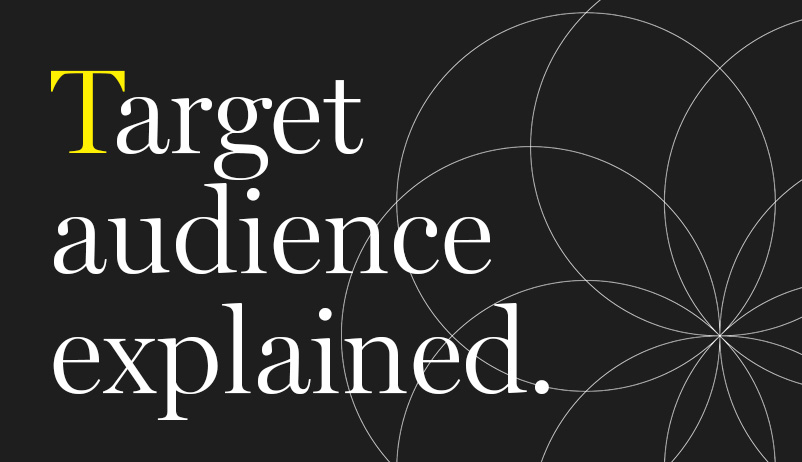

Word Of Mouth
Word Of Mouth
What is Word Of Mouth?
Lorem ipsum dolor sit amet, consectetur adipiscing elit. Suspendisse varius enim in eros elementum tristique. Duis cursus, mi quis viverra ornare, eros dolor interdum nulla, ut commodo diam libero vitae erat. Aenean faucibus nibh et justo cursus id rutrum lorem imperdiet. Nunc ut sem vitae risus tristique posuere.
What Does Word of Mouth Marketing Mean?
Word of mouth marketing (sometimes abbreviated as WOMM, or shortened to WOM) is a marketing technique that involves encouraging and amplifying positive conversations about a brand, product, or service among existing customers, potential customers, and the wider public. WOM is often considered one of the most effective forms of marketing, as it relies on the trusted opinions and recommendations of people known and trusted by the target audience.
How Does Word of Mouth Marketing Work?
Word of mouth marketing relies on customers or individuals voluntarily promoting a product, service, or brand through informal communication channels. It can occur both offline and online, and it typically involves the following steps:
- Satisfied Customers: It starts with providing an exceptional customer experience and delivering value to customers, so they become satisfied and enthusiastic about the product or service.
- Advocacy: Satisfied customers then become brand advocates who voluntarily share positive information or recommendations about the product or service with others, either through conversations, social media, online reviews, testimonials, or other forms of interpersonal communication.
- Amplification: The positive messages shared by brand advocates can amplify and spread further as others in their network share the information with their own circles, creating a ripple effect.
- Trust and Credibility: Word of mouth marketing is effective because it is based on the trust and credibility of personal recommendations. People tend to trust recommendations from friends, family, colleagues, or online communities more than traditional advertising.
- Influence: Positive word of mouth can influence others' purchasing decisions and lead to increased brand awareness, customer acquisition, and brand loyalty.
- Monitoring and Engagement: Monitoring and engaging with word of mouth marketing efforts, such as monitoring online reviews and social media mentions, and engaging with customers and brand advocates, can help amplify the positive messages and address any negative feedback.
Overall, word of mouth marketing works by leveraging the power of satisfied customers becoming brand advocates and voluntarily spreading positive messages about a product or service, which can lead to increased brand visibility, credibility, and customer engagement.

Different Types of Word of Mouth Marketing.
Word of mouth marketing can be categorised into different types based on its nature and origin. Some common types of word of mouth include:
Organic Word of Mouth
This occurs naturally when satisfied customers or individuals voluntarily share positive information or recommendations about a product, service, or brand without any incentives or prompting.
Amplified Word of Mouth
This type of word of mouth marketing is intentionally amplified or encouraged by the brand through various means, such as referral programs, influencer marketing, or social media campaigns.
Buzz Marketing
This type of word of mouth marketing involves creating a buzz or generating excitement around a product, service, or brand through unconventional or viral marketing techniques, such as guerrilla marketing, stunts, or publicity events.
Evangelism
This type of word of mouth marketing involves passionate customers or brand advocates who actively promote and defend the brand, often going above and beyond to spread positive messages and defend the brand against criticism or negative feedback.
Employee Advocacy
This type of word of mouth marketing involves employees of a company acting as brand advocates and sharing positive information or recommendations about the company's products or services through their personal networks or social media.
Influencer Marketing
This type of word of mouth marketing involves partnering with influencers, who have a large following and influence over their audience, to promote a product or service through their content and recommendations.
Consumer Reviews and Testimonials
This type of word of mouth marketing involves customers providing reviews or testimonials about a product or service, which can influence others' purchasing decisions.
Social Media Word of Mouth
This type of word of mouth marketing occurs through social media platforms, where customers or individuals share their experiences, recommendations, or opinions about a product or service with their online connections.
These are just some examples of the types of word of mouth marketing. The specific types of word of mouth marketing that are effective for a particular brand or business may vary depending on the industry, target audience, and marketing objectives.

"Word of mouth marketing harnesses the power of genuine recommendations, creating trust and credibility. While cost-effective and influential, businesses must navigate its limitations - lack of control, negative impact, limited reach - for successful implementation."
Paul Mills
Founder, VCMO
What Are the Advantages of Word of Mouth Marketing?
Word of mouth marketing can offer several advantages for businesses, including:
- Cost-effectiveness: Word of mouth marketing can be a cost-effective way to promote a product, service, or brand, as it relies on customers or individuals voluntarily sharing positive information or recommendations without direct costs to the business.
- Credibility and Trust: Word of mouth marketing is often seen as more credible and trustworthy compared to traditional advertising, as it involves real people sharing their genuine experiences and opinions. Positive word of mouth can help build trust and credibility for a brand, which can influence potential customers' purchasing decisions.
- Increased Reach and Awareness: Word of mouth marketing has the potential to reach a wide audience, as people share information or recommendations with their personal networks, which may include friends, family, colleagues, and online connections. This can help increase brand awareness and reach among new audiences.
- Higher Conversion Rates: Word of mouth marketing can lead to higher conversion rates, as recommendations from friends, family, or trusted sources are often considered more influential in driving purchasing decisions compared to traditional advertising.
- Brand Advocacy and Loyalty: Word of mouth marketing can help create brand advocates who are passionate about a brand and actively promote it to their networks. Brand advocates can contribute to increased customer loyalty, repeat business, and long-term customer relationships.
- Virality and Amplification: Word of mouth marketing has the potential to go viral, as positive recommendations or experiences can be shared and amplified through social media and other online channels, leading to increased exposure and brand visibility.
- Feedback and Insights: Word of mouth marketing can provide valuable feedback and insights from customers, as they share their experiences, opinions, and recommendations. This feedback can help businesses identify areas for improvement, make necessary adjustments, and enhance their products or services.
Overall, word of mouth marketing can offer several advantages for businesses, helping them create brand awareness, credibility, trust, loyalty, and drive sales, all while being cost-effective compared to traditional advertising methods.
What Are the Disadvantages of Word of Mouth Marketing?
While word of mouth marketing can be a powerful and cost-effective strategy, it also has some potential disadvantages, including:
- Lack of Control: Word of mouth marketing relies on customers or individuals voluntarily sharing information or recommendations, which means businesses have limited control over the messaging, timing, and targeting of the marketing efforts. This lack of control can result in inconsistent or inaccurate information being shared, which may not align with the business's marketing objectives.
- Negative Word of Mouth: While positive word of mouth can be beneficial, negative word of mouth can also spread quickly and have detrimental effects on a business's reputation. Negative experiences or opinions shared by customers or individuals can be amplified through word of mouth, social media, and online reviews, potentially leading to a decrease in brand reputation and customer trust.
- Limited Reach: While word of mouth marketing has the potential to reach a wide audience, it may not always have the same level of reach as traditional advertising methods, especially if the business lacks a significant customer base or a strong brand presence. Word of mouth relies on customers or individuals voluntarily sharing information, and not all customers may actively engage in word of mouth marketing.
- Lack of Scalability: Word of mouth marketing may not be scalable for all businesses, especially those that operate in niche markets or have limited customer bases. Businesses with limited customer reach or those in highly competitive markets may find it challenging to rely solely on word of mouth marketing for significant business growth.
- Difficult to Measure: Measuring the effectiveness of word of mouth marketing can be challenging, as it is often difficult to attribute specific outcomes, such as increased sales or conversions, solely to word of mouth efforts. Unlike traditional advertising methods that can be more easily tracked and measured, word of mouth marketing may lack clear and quantifiable metrics for evaluation.
- Inconsistent Messaging: Word of mouth marketing relies on individuals sharing information or recommendations, which can result in inconsistent messaging. Different individuals may share different opinions, experiences, or information about the same business or product, which can lead to mixed messaging and confusion among potential customers.
Despite these disadvantages, word of mouth marketing can still be a valuable strategy for businesses when implemented strategically and complemented with other marketing efforts. It is important for businesses to carefully consider the potential limitations and develop appropriate strategies to mitigate any risks associated with word of mouth marketing.
Recap on Word of Mouth Marketing.
Word of mouth can be a powerful and cost-effective marketing strategy, as it leverages the influence of personal recommendations and referrals. The benefits of word of mouth marketing include increased brand awareness, enhanced trust and credibility, and potential for customer loyalty and repeat business.
However, word of mouth marketing also has limitations, such as lack of control over messaging, potential for negative word of mouth, limited reach, lack of scalability, difficulty in measurement, and inconsistent messaging. It is essential for businesses to carefully consider these factors and develop strategies to effectively leverage the advantages of word of mouth marketing while mitigating potential limitations.
About VCMO
VCMO is a UK-based provider of fractional marketing services, supporting B2B SMEs—ranging from funded scale-ups to mid-tier and private equity-backed businesses—through key moments of growth and transformation. Its Chartered Fractional CMOs and SOSTAC® certified planners embed strategic marketing leadership into organisations navigating product launches, new market entry, acquisitions, and leadership gaps.
Ready to take your marketing to the next level? Let us help you get there.
Subscribe to Our Newsletter
Fractional Edge is our montly newsletter sharing expert opinion on the latest trends in fractional leadership, curated marketing content from leading sources, VCMO events, and much more. Subscribing is quick — just add your name and email.






